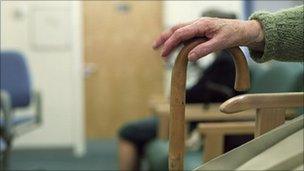Elderly care in England 'in crisis', charity warns
- Published

Age UK says 1.8m pensioners live beneath the poverty line
The care of the elderly in England could be plunged in to "absolute crisis" by the government's spending cuts, the head of a charity has warned.
Michelle Mitchell, director of Age UK, told the Guardian newspaper, external council care cuts could leave older people with "absolutely no support at all".
She said there was evidence authorities had cut elderly care by 4.5% this year.
Care Services Minister Paul Burstow said the government had provided £7.2bn over the next four years to councils.
In the Guardian interview, Ms Mitchell said "care is in crisis and it is getting worse", and the spending cuts could leave the elderly at risk of "absolutely no support at all, or poor quality and limited support".
"We have evidence to show that local authorities have cut care for older people by 4.5% this year, and this at a time when social care is chronically underfunded anyway," she said.
'No justification'
Ms Mitchell said recent research by the King's Fund showed that by 2015 there were expected to be one million older people needing significant care but without assistance, up from almost 900,000 in 2012.
"This means people will deteriorate more quickly and go into hospital.
"We have seen the rates of admissions to hospital increase over the last few months which, apart from anything else, is very expensive to have someone admitted through A&E and then kept in hospital," she said.
The charity said 1.8m pensioners live beneath the poverty line, one million of them in "severe poverty".
Ms Mitchell added: "One of the biggest worries, whether you are in poverty or whether you are managing on a very, very low income, is that the cost of living is increasing very rapidly.
"This is a story about breadline Britain and the eking out of an existence for millions of pensioners."
In a statement, Mr Burstow said "there was no justification for cutting services for the vulnerable" because "the money is there".
"Smart councils are doing things differently and protecting services. That is why earlier this year the government invested £300,000 in a Local Government Association scheme to support councils to improve productivity in social care," he said.
"The evidence is clear: the most innovative councils are protecting access to elderly care services and getting better outcomes. They are doing it by listening to carers and service users to develop new ways of working."
- Published11 December 2011
- Published9 December 2011
- Published13 October 2011
- Published2 December 2011
- Published23 November 2011
- Published22 November 2011
- Published10 July 2011
- Published4 July 2011